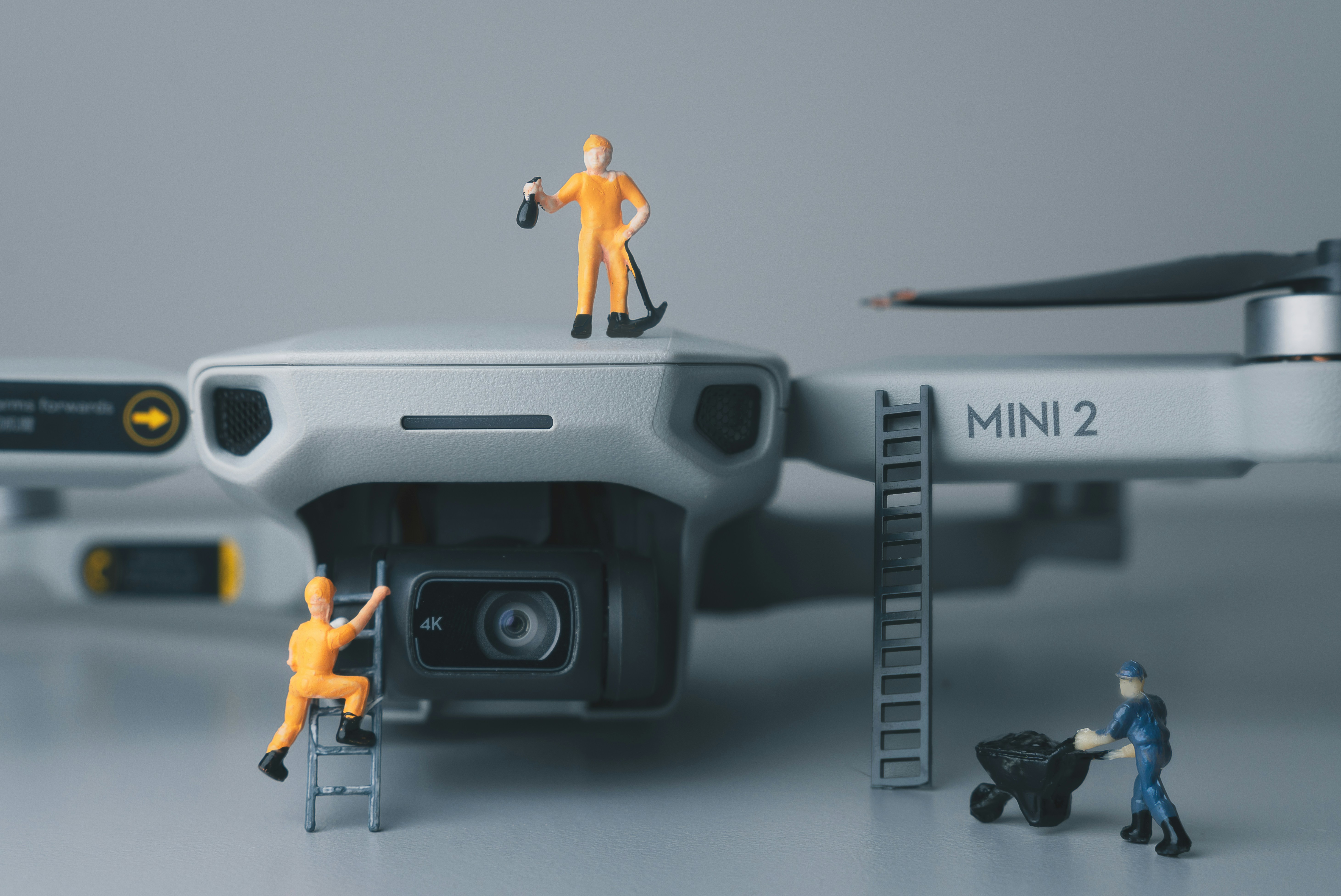
Top Skills Employers Look for in UAV Operators
Unmanned Aerial Vehicles (UAVs), commonly known as drones, are revolutionising various industries such as agriculture, construction, filmmaking, and emergency services. As the demand for UAV technology continues to grow, so does the need for skilled UAV operators. To stand out in this competitive job market, aspiring operators must possess a range of key skills and certifications. This article outlines the top skills employers look for when hiring UAV operators, with a focus on drone piloting, data analysis, safety compliance, and more. Whether you're searching for UAV operator jobs or looking to enhance your skill set, this guide will help you understand what employers are prioritising.
1. Drone Piloting Proficiency
Drone piloting is the foundation of UAV operations, but being proficient involves much more than basic flying skills. Employers are searching for operators who can:
Navigate Complex Environments: Operating a UAV in challenging terrains, crowded urban areas, or near infrastructure requires advanced piloting skills. Employers value operators who can fly drones safely and efficiently in various environments, especially under pressure.
Execute Advanced Manoeuvres: For tasks such as cinematography or inspection, operators must perform precise and advanced manoeuvres. This skill is particularly important in industries where accuracy and smooth operation are critical.
Understand Flight Dynamics: A deep understanding of how UAVs respond to different weather conditions, payloads, and speeds is crucial. Employers prefer operators who can anticipate these factors and make necessary adjustments to maintain control and ensure successful missions.
2. Data Analysis and Interpretation
UAVs collect vast amounts of data, including high-resolution images, thermal readings, and multispectral data. The ability to analyse and interpret this data is a key skill employers look for. Successful UAV operators should be able to:
Process and Analyse Data: Beyond flying, processing the data collected during a mission is essential. This involves using specialised software to create maps, models, and reports. Strong analytical skills allow operators to extract meaningful insights from raw data, making them invaluable to employers.
Understand Geographic Information Systems (GIS): In industries like surveying, agriculture, and environmental monitoring, GIS knowledge is vital. UAV operators who can integrate UAV data with GIS platforms to produce actionable maps and analytics are highly sought after.
Provide Accurate Reporting: Employers expect operators to deliver accurate and clear reports. This requires not only technical know-how but also the ability to communicate findings effectively to clients or stakeholders who may not have a technical background.
3. Safety Compliance and Risk Management
Safety is a top priority in UAV operations, and strict regulations govern the use of UAVs, particularly in commercial settings. Employers prioritise candidates who demonstrate a strong commitment to safety and compliance. Important aspects include:
Regulatory Knowledge: UAV operators must be familiar with regulations set forth by aviation authorities like the Civil Aviation Authority (CAA) in the UK or the Federal Aviation Administration (FAA) in the US. This includes understanding airspace classifications, no-fly zones, and requirements for commercial UAV operations.
Risk Assessment and Mitigation: Employers value operators who can conduct thorough risk assessments before any flight, identifying potential hazards and implementing measures to mitigate them. This includes pre-flight inspections, understanding environmental factors, and ensuring that the UAV is in optimal condition.
Emergency Preparedness: The ability to respond to emergencies, such as sudden weather changes, equipment malfunctions, or unexpected obstacles, is critical. Employers look for operators who have a well-practised emergency response plan and can remain calm under pressure.
4. Technical Aptitude and Equipment Maintenance
A strong technical aptitude is essential for UAV operators, as they are often responsible for maintaining and troubleshooting their equipment. This includes:
Understanding UAV Systems: Operators should have a deep understanding of the mechanics and electronics of the drones they operate. This knowledge allows them to diagnose issues, perform basic repairs, and ensure that the UAV is functioning correctly before each mission.
Software Proficiency: Employers seek operators who are proficient in the software used for flight planning, data processing, and reporting. Familiarity with applications like Pix4D, DroneDeploy, and AutoCAD, as well as basic programming skills for custom automation or data processing tasks, is highly valued.
Routine Maintenance: Regular maintenance is essential to prevent equipment failures during critical missions. Employers prefer operators who can independently perform routine maintenance tasks, such as battery management, calibration of sensors, and firmware updates.
5. Communication and Teamwork
While UAV operation might seem like a solitary job, it often requires strong communication and teamwork skills. Employers look for operators who can:
Collaborate Effectively: UAV missions often involve working with a team, including clients, other operators, and project managers. The ability to work collaboratively and communicate effectively is essential to ensure that everyone is aligned and that the mission objectives are met.
Client Interaction: In commercial UAV operations, operators often need to interact directly with clients. This requires professionalism, the ability to understand client needs, and the skill to explain complex technical details in a way that is accessible to non-experts.
Report Writing: Beyond verbal communication, UAV operators must also be able to produce clear and concise written reports. These reports often need to summarise technical findings in a way that is understandable to a broad audience, making strong writing skills a valuable asset.
6. Problem-Solving and Critical Thinking
UAV operations are often unpredictable, with operators needing to adapt to rapidly changing conditions. Employers highly value operators who demonstrate strong problem-solving and critical thinking abilities, such as:
Quick Decision-Making: Whether it’s an unexpected obstacle during a flight or a sudden weather change, operators must be able to make quick, informed decisions to ensure the safety and success of the mission.
Innovation: The UAV industry is constantly evolving, and employers seek operators who are not only adept at using current technology but also capable of innovating and improving processes. This might involve developing new flight patterns to increase efficiency or finding creative solutions to unique challenges.
Adaptability: UAV operators must be flexible and able to adjust their approach based on the mission's requirements and any unforeseen challenges. Employers value those who can maintain composure and effectiveness in dynamic environments.
7. Certifications and Professional Development
Certifications play a significant role in validating a UAV operator’s skills and knowledge. Employers often require specific certifications as a baseline for hiring and look favourably upon candidates who pursue continuous professional development. Key certifications include:
CAA Permissions for Commercial Operations (PfCO) (UK): In the UK, UAV operators must obtain the CAA’s Permission for Commercial Operations (PfCO) or the newer General Visual Line of Sight Certificate (GVC) under the UK Drone and Model Aircraft Registration and Education Scheme. This certification is essential for legally conducting commercial drone operations.
FAA Part 107 Certification (USA): In the United States, obtaining the FAA Part 107 Remote Pilot Certificate is a legal requirement for anyone operating a UAV for commercial purposes. This certification demonstrates that the operator understands the necessary regulations, airspace classifications, and safety procedures.
Other Relevant Certifications: Depending on the industry, additional certifications may be required or beneficial. For example, certifications in GIS, photogrammetry, or specific software platforms can enhance an operator’s qualifications.
Continuous Learning: The UAV industry is rapidly evolving, with new technologies, regulations, and best practices emerging regularly. Employers value operators who stay up-to-date through continuous learning and professional development, such as attending workshops, participating in industry conferences, and pursuing advanced certifications.
8. Industry-Specific Knowledge
UAV operations are employed across various industries, each with its own unique requirements and challenges. Employers often seek operators with specialised knowledge relevant to their industry, including:
Agriculture: In precision agriculture, UAV operators need to understand crop management practices, plant health indices, and how to use drones for tasks like spraying, seeding, and monitoring crop growth.
Construction and Infrastructure: Operators working in construction need knowledge of site surveying, progress monitoring, and how to use UAVs for tasks like 3D modelling, volumetric analysis, and safety inspections.
Emergency Services: In search and rescue or firefighting, operators must be skilled in using UAVs for real-time situational awareness, thermal imaging, and coordinating with ground teams to assist in emergencies.
Environmental Monitoring: UAV operators in environmental fields need to understand ecosystem monitoring, wildlife tracking, and how to use UAVs for data collection in conservation efforts.
9. Legal and Ethical Awareness
Operating UAVs comes with significant legal and ethical responsibilities. Employers prioritise candidates who demonstrate a strong understanding of these aspects, including:
Privacy Laws: UAV operators must be aware of privacy regulations that govern the collection of data in public and private spaces. Employers look for operators who respect these boundaries and understand how to navigate them legally.
Intellectual Property: In industries like filmmaking or surveying, the data captured by UAVs may be subject to intellectual property laws. Employers value operators who understand these legal implications and can manage data accordingly.
Ethical Operation: Beyond legal requirements, ethical considerations play a role in UAV operations. This includes respecting community concerns, ensuring that UAVs are not used in ways that could harm people or wildlife, and being transparent with stakeholders about the capabilities and limitations of UAV technology.
10. Project Management Skills
As UAV operations become more integrated into business processes, employers increasingly seek operators who can manage projects from start to finish. This includes:
Planning and Coordination: UAV operators with project management skills can effectively plan missions, coordinate with teams, and ensure that all aspects of the operation are aligned with the project’s goals.
Budgeting and Time Management: Employers value operators who can manage budgets, optimise resource use, and keep projects on schedule. This is particularly important in commercial operations where time is money, and delays can be costly.
Client Management: Operators with project management skills are often involved in client-facing roles, ensuring that the project meets client expectations and is delivered on time and within budget. This requires strong organisational skills and the ability to manage multiple stakeholders.
FAQ: Common Questions About UAV Operator Skills and Careers
1. What is the difference between a UAV operator and a drone pilot?
While the terms are often used interchangeably, a UAV operator typically has broader responsibilities beyond just flying the drone. This includes tasks like mission planning, data analysis, equipment maintenance, and compliance with safety regulations. A drone pilot, on the other hand, may primarily focus on the piloting aspect alone.
2. Do I need a university degree to become a UAV operator?
No, a university degree is not always required to become a UAV operator. However, having a degree in a relevant field, such as engineering, geography, or information technology, can be beneficial and may open up more advanced career opportunities. What’s often more important are the certifications, practical experience, and specific skills relevant to UAV operations.
3. How important is experience with manned aviation for a UAV operator?
While experience with manned aviation can provide useful insights into airspace management and flight dynamics, it is not a prerequisite for becoming a UAV operator. Employers are more interested in your experience with UAVs specifically, including your ability to operate them safely and efficiently, as well as your knowledge of UAV-specific regulations.
4. What are the most common industries hiring UAV operators?
The most common industries hiring UAV operators include agriculture, construction, real estate, environmental monitoring, emergency services, filmmaking, and surveying. These industries use UAVs for tasks such as aerial mapping, crop monitoring, site inspection, and creating promotional content.
5. Can I work as a freelance UAV operator, or do I need to be employed by a company?
Yes, you can work as a freelance UAV operator. Many UAV operators choose to work as freelancers or run their own businesses, offering services such as aerial photography, surveying, and inspections to a variety of clients. However, freelancing requires strong business skills, including marketing, client management, and financial planning.
6. How often do UAV operators need to update their certifications?
This depends on the specific certification and the regulations of the country in which you operate. For example, in the UK, the General Visual Line of Sight Certificate (GVC) needs to be renewed every 12 months. It’s important to stay updated on any changes in regulations and ensure that your certifications are current to avoid legal issues.
7. What types of UAVs should I learn to operate to increase my employability?
To increase employability, it’s beneficial to gain experience with a range of UAVs, from small consumer drones to larger, more complex systems used in industrial applications. Understanding how to operate multirotor drones, fixed-wing UAVs, and hybrid models can make you more versatile and attractive to potential employers.
8. Are there any physical or health requirements to become a UAV operator?
There are generally no strict physical or health requirements for UAV operators, but good hand-eye coordination, steady hands, and sharp eyesight are beneficial for piloting drones. Additionally, operators should be able to work in various outdoor environments and sometimes under challenging weather conditions.
9. How can I gain experience in UAV operations if I’m just starting out?
To gain experience, you can start by practising with a basic drone in a safe, open area. Volunteering for projects that require aerial photography or mapping, taking part in UAV clubs or competitions, and completing internships with companies that use drones are all good ways to build experience. Additionally, working on personal projects and building a portfolio of your work can help demonstrate your skills to potential employers.
10. What are the future trends in UAV operations that I should be aware of?
Future trends in UAV operations include the increasing use of AI and machine learning for data analysis, the development of autonomous drones, the integration of UAVs with other technologies like IoT (Internet of Things), and expanding applications in logistics and delivery services. Staying informed about these trends and developing skills in these areas can position you as a forward-thinking operator in a rapidly evolving field.
Conclusion
The role of a UAV operator is multifaceted, requiring a combination of technical expertise, analytical skills, and a strong commitment to safety and ethics. As the industry continues to grow, the expectations of employers are becoming increasingly sophisticated. Beyond just flying a drone, employers are looking for operators who can handle complex data, navigate regulatory landscapes, and contribute to projects across various industries.
For those seeking UAV operator jobs, it’s crucial to invest in skill development and obtain relevant certifications. By focusing on the key areas outlined in this article—drone piloting proficiency, data analysis, safety compliance, technical aptitude, communication, problem-solving, industry-specific knowledge, legal awareness, and project management—you can position yourself as a top contender in a competitive job market.
As technology advances and the applications of UAVs expand, the demand for skilled operators will only increase, making it an exciting and promising career path for those equipped with the right skills and mindset.
Looking for UAV operator jobs? Sign up for our job alerts and newsletter to stay updated on the latest opportunities in the UAV industry. Don’t miss out on the chance to advance your career in this fast-growing field!


